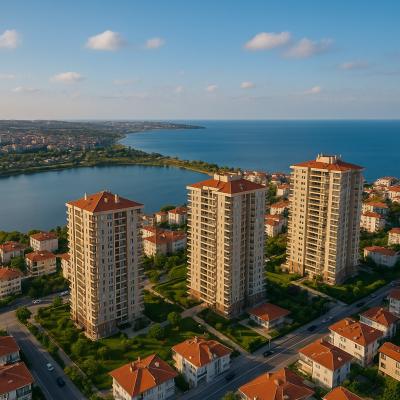Last Update Date:01/11/2024

Explore the latest report on real estate sales in Turkey for September 2024, including factors driving growth, foreign buyer trends, and the impact of inflation on the Turkish real estate market
Real Estate Sales in Turkey: September 2024 Report and Continued Growth Amid Economic Challenges
The real estate sector in Turkey has remained one of the most active and attractive segments of the country's economy in recent years. Despite facing economic challenges such as inflation and rising construction costs, the sector continues to thrive. According to data from the Turkish Statistical Institute (TUIK), real estate sales in Turkey have increased significantly in September 2024 compared to the same month last year. This article will examine the factors contributing to this growth, trends in domestic and foreign sales, and government measures to support the sector.
Investment Climate in Turkey: Growing Demand Despite Challenges
The Turkish real estate market has shown remarkable resilience, with real estate sales increasing by 37.3% in September 2024, reaching a total of 140,919 units. This growth is significant, especially when considering the challenges posed by inflation and the rising costs of raw materials. Despite these obstacles, demand for real estate has not waned, particularly in major cities like Istanbul, Ankara, and Izmir, which continue to see high sales.
While inflation has led to higher property prices, it has also encouraged individuals and investors to view real estate as a safe investment to protect their capital. This phenomenon has contributed to the continued growth of the market, with both new and second-hand properties in high demand.
Sales Patterns: Mortgaged vs. Other Sales Types
The data reveals that mortgaged house sales have seen a significant increase, with a rise of 87.4% in September 2024 compared to the previous year. However, mortgaged sales for the first nine months of 2024 have decreased by 42.6%, totaling 92,310 units. On the other hand, other types of sales, which do not involve mortgages, have continued to grow, with a 32.8% increase in September 2024. These sales amounted to 125,094 units, reflecting the overall positive trend in the market.
First-hand vs. Second-hand Sales
First-hand sales (new homes) made up a substantial portion of the overall sales, with 44,858 units sold in September, marking a 47.1% increase compared to the same month last year. This growth indicates that developers are meeting the high demand for new housing, with ongoing construction projects continuing to add supply to the market.
Meanwhile, second-hand sales (used homes) also saw strong performance, increasing by 33.1% in September, with 96,061 units changing hands. This reflects a healthy demand for existing properties, and the market for second-hand homes remains active and competitive.
Foreign Buyers: A Decline in Sales but Continued Interest
In September 2024, foreign property sales dropped by 31%, with 2,022 units sold to foreign buyers. This decline can be attributed to the global economic uncertainties, as well as the challenges posed by inflation. However, Turkey remains an attractive destination for foreign investors, particularly from countries such as Russia, Iran, and Iraq.
Despite the drop in foreign sales in September, the total foreign sales for the January-September period declined by 39.1%, reaching 17,090 units. Russians led the list of foreign buyers in September, followed by Iranians and Iraqis.
Impact of Inflation on the Real Estate Market
Inflation in Turkey has had a dual impact on the real estate market. On one hand, property prices have risen significantly, making it more expensive to purchase homes. On the other hand, inflation has led many investors to view real estate as a safe haven for preserving the value of their money, contributing to continued demand in the market.
Government Measures to Support the Real Estate Sector
The Turkish government has implemented several measures to support the real estate market, including offering low-interest mortgage loans and introducing policies aimed at increasing the supply of affordable housing. These initiatives have played a critical role in sustaining the growth of the sector, particularly in the face of economic challenges.
Moreover, the government has also focused on streamlining the process for foreign investors, offering incentives and simplifying the legal procedures for purchasing property. This has helped attract foreign buyers and maintain the international appeal of Turkey's real estate market.
Conclusion: Continuous Growth in the Turkish Real Estate Market
Despite the economic challenges, including inflation and rising construction costs, the Turkish real estate market remains resilient. While foreign sales may have experienced a decline, local demand remains strong, and the market continues to grow. The Turkish real estate sector offers numerous opportunities for investors, both domestic and international, and continues to be an attractive and stable investment option.
As long as the Turkish government continues to implement supportive policies, and developers maintain a strong supply of new and affordable housing, the real estate market in Turkey is likely to continue its growth trajectory, providing opportunities for years to come.










































